When Sharon Simes saw a sudden burst of light as she lay on her sun-lounger, she assumed it was the flash of a camera.
Why would it be anything else? All around her, on a warm June morning, happy holidaymakers were enjoying the beach at the Tunisian resort of Port El Kantaoui.
It took just a few bewildering, frantic seconds for Sharon, now 54, to realise the light she had glimpsed to her right was a spark coming from a loaded gun wielded by a terrorist who was firing indiscriminately as he traversed the sand.
Diving instinctively into the gap between their loungers, she and husband Dave cowered in terror as they watched the gunman shoot dead a sleeping couple directly in front of them.
‘They had miniscule, if any, chance,’ she says now, blinking back tears. ‘We only survived because we were on the third row of sun-loungers, sitting up, while they were on the front row oblivious to the chaos unleashed around them.
‘If I had got a place I wanted – on the front row of sunbeds – we wouldn’t be here today.’
That couple were John and Janet Stocker, from Crawley, West Sussex, who tragically left behind five children and ten grandchildren. They were just two of the 38 victims, 30 of whom were British, who lost their lives after Tunisian student Seifeddine Rezgui inflicted Britain’s largest loss of life to terrorism since the 2005 London bombings.
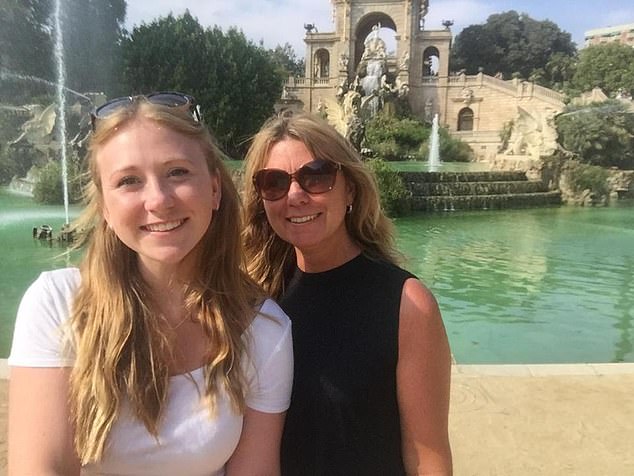
Sharon and daughter Krystal holidaying in Tunisia before the attack
It is ten years this week since Rezgui launched his attack, which also left dozens of traumatised victims in his wake – among them Sharon, Dave and their daughter Krystal, who was just 17 at the time and who, after fleeing to the five-star hotel from her lounger by the pool, had to hide in an office as the gunman roamed the corridor looking for more victims.
All their stories feature in a compelling new Amazon documentary, which forensically reconstructs the events of that day, as well as revealing previously untold stories of heroism and courage.
In it, Sharon, a softly spoken former mortgage adviser who now lives on the Isle of Wight with Dave, speaks about her ordeal for the first time.
‘It has taken a long time to get me to this point,’ she says. ‘For a long time, I tormented myself with all the sliding doors moments – choosing Tunisia, choosing to sit on the beach that day.
‘I thought we shouldn’t have gone there, we were in the wrong place at the wrong time. But actually, you know, in hindsight and having had therapy, I realise he [Rezgui] was in the wrong place. He shouldn’t have been there, and he shouldn’t have done what he did.’
Rezgui, 23, took his exact reasons for the attack with him to his grave. Previously unknown to the security services, the electronics student is said to have been radicalised online and was close to a mosque that provided extreme Islamist teachings. An unconfirmed report linked him to Saifallah Ben Hassine, a fanatic who was based in London for at least three years and was a disciple of the radical cleric Abu Qatada.
In the wake of the attack, the extremist group Islamic State claimed responsibility, referring to Rezgui by a nom de guerre, Abu Yahya al-Qayrawani.
Sharon and her family had holidayed in Tunisia the previous year and enjoyed it so much that they resolved to return. This time, Krystal asked if she could bring a friend to mark her forthcoming 18th birthday. ‘She said she didn’t want a party, she would rather have a holiday,’ Sharon says.
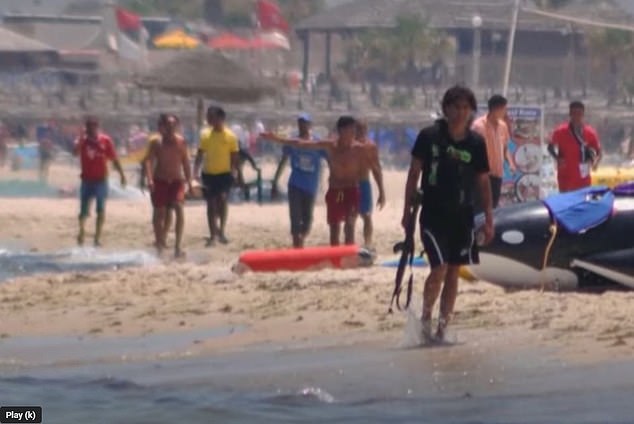
Seifeddine Rezgui opened fire on a tourist beach in 2015
So the family, along with Krystal’s friend Chelsea, arrived at the Hotel Riu Imperial Marhaba – a luxury beach resort near the city of Sousse in Tunisia – from their home in Kent on June 23. They enjoyed three blissful days of sunbathing by the pool before, on the fourth day of the trip, Sharon said she wanted to go to the beach. ‘Dave and I love the beach. But the girls prefer the pool, so they chose to stay there.’
It was quiet when they arrived. Some holidaymakers were playing volleyball, but most just enjoying another perfect sunny day.
What none of them could know was that, yards away, Rezgui was about to embark on his deadly mission. At 11.13am, security camera footage captured him being dropped off in a van near the beach and walking towards it carrying a white parasol. Hidden inside was an AK47 rifle.
By 11.50am, he had started his attack, walking down the beach and firing indiscriminately at those around him, including people on the loungers in front of the Simes’s. Having instinctively leapt into the gap between their loungers, Sharon recalls the feeling of the sand jumping around her as the bullets hit and listening with unfolding horror as he continued his slaughter.
‘The noise was something else,’ she says quietly. ‘It was just chaos. I thought I was going to die at any second.’
When the firing stopped, Dave, who was looking over his wife to the gunman, saw him reload a magazine and walk up to shoot people where they were hiding in between loungers, this time one bullet at a time.
‘Dave grabbed my wrist and said: ‘We need to run,’ ‘ Sharon recalls. ‘He knew we were sitting ducks.’ Her eyes fill with tears as she recalls running for her life amid the bullets under the blazing sun before collapsing on the sand, gasping for breath, resigning herself to lying there to await her fate.
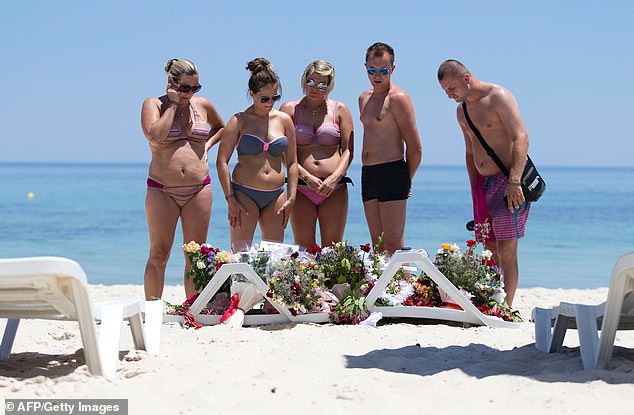
Tourists look at flowers laid at the site of the beach atrocity two days after the attack near the city of Sousse
As the English Literature graduate recounts in an unpublished memoir she has written to help her recovery, she was later tormented by this paralysis.
‘I kept going over and over it,’ she writes. ‘Why I didn’t get up straight away but lay there awaiting my death amid the shouting and screaming?
‘I just gave up and I felt guilty about that for a long time. It took lots of therapy to understand that I had a freeze response.’
As it was, Dave grabbed his wife’s wrists once more and pulled her to her feet and the couple ran as fast as they could to the neighbouring hotel. Along with other bewildered holidaymakers, they took shelter in a young couple’s hotel room, frantic to contact Krystal and Chelsea to tell them not to go to the beach.
Yet having left her mobile in the safe in her room, Sharon realised to her horror that she could not remember Krystal’s number.
‘I’ll never forget that feeling,’ she says now. ‘I was beside myself, thinking, what kind of mum doesn’t even know her daughter’s phone number off by heart?’
Sharon was unaware that Krystal was navigating her own trauma. Having realised a gunman was prowling nearby, she attempted to run to the beach to try to warn her parents, only for her friend Chelsea to drag her to the hotel.
‘I now think in many ways it was worse for Krystal, because she knew that the guy was shooting on the beach, she knew people were running into the hotel, and I wasn’t one of them,’ says Sharon. ‘So she was going through hell, thinking I was dead.’
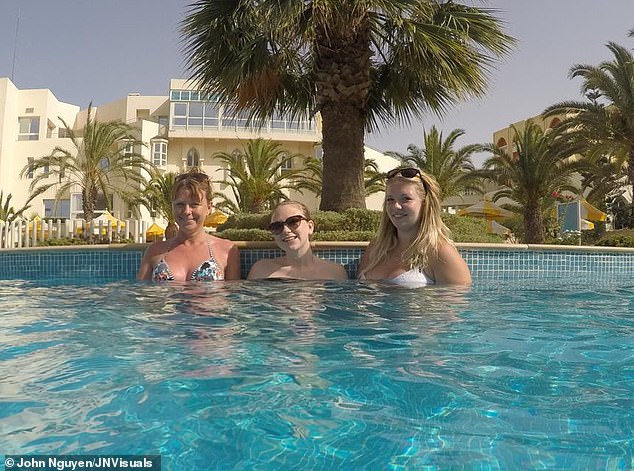
Sharon and Krystal with pal Chelsea all survived the attack
At that point, as Sharon lay trembling on the floor of a hotel room, the door barricaded by a mattress, she had no idea that the gunman had left the beach and had made his way into the Marhaba hotel where, along with a group of other holidaymakers, Krystal had crammed into a small office room.
Huddled together, everyone was holding their breath in terror as the gunman paraded the corridor, shooting and, at one point, letting off a grenade outside the door as the terrified group tried not to make a sound.
‘Now I think perhaps it was a blessing that I couldn’t ring her. If her phone had been ringing incessantly, that could have drawn attention to them,’ says Sharon.
By 12.10pm, the gunman had left the hotel and returned to the beach, pursued by locals. Twenty minutes later, he was shot dead in the street by police.
Finally, the terrified holidaymakers were told they were safe to come out – although their ordeal was far from over.
Leaving the office, Krystal, convinced her mum was dead, had to navigate the horror of pools of blood and dead bodies in the hotel corridor.
Returning to the hotel meanwhile, Sharon was confronted by a melee of helicopters, ambulances and military vehicles.
‘It looked like a war zone,’ she says. ‘I only realised then that the gunman had been into the hotel.’
Thankfully, within moments, as she was paralysed by fear that something had happened to Krystal, she saw her daughter running towards her.
‘I think we had the longest hug I’ve ever had in my life,’ Sharon says now, her emotion all too clear as she remembers.
Even then, tensions remained high as the traumatised survivors were told to gather in the hotel restaurant under armed guard.
‘At one point someone shouted out: ‘There he is!’ They thought there was another gunman outside, so everyone dived back under the tables,’ Sharon recalls.
Later that night, armed vehicles escorted families back to the airport for the flight home, Krystal holding her hand luggage against the window in case there was a gunman on the road.
‘No one knew what to say to each other,’ Sharon recalls. ‘We were all still so scared.’
Even when she returned to the family home in Kent, that feeling of visceral fear remained. Sharon was consumed with a hyper-vigilance that led to terror of unexpected noises or strangers walking too close. She couldn’t cope with crowds or public places.
‘I was scared I was going to be found. Scared I was going to get killed, or that people were going to get Krystal,’ she says.
As time went on, Sharon started ordering ration packs and collecting water, preparing for some kind of calamity she couldn’t even name.
‘I knew I needed to get help, as the feelings I had from Tunisia weren’t going anywhere. They were getting worse,’ she says. ‘There was a lot of guilt about not protecting Krystal and I think that made me want to protect her even more.’
Extensive therapy has, over time, helped her realise that she had no control over events that day.
Therapy also helped when, in April 2019, Sharon was diagnosed with breast cancer at the age of 49.
After noticing a dent in her left breast as she lay in the bath, she was later found to have cancer in both breasts.
‘Although it was a shock. I wonder if what happened actually helped me, because I was hyper-alert,’ she says.
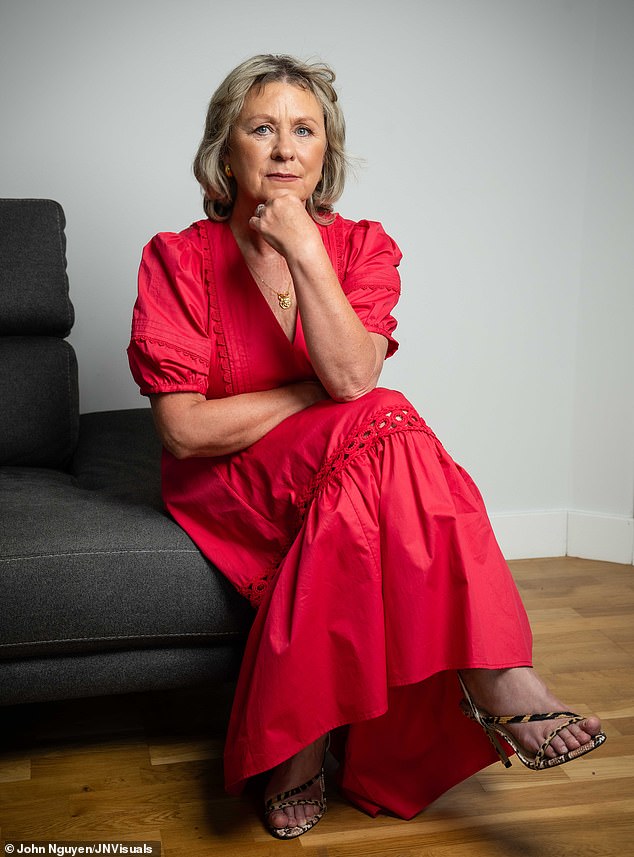
Even when Sharon returned to the family home in Kent, she was consumed with a hyper-vigilance that led to terror of unexpected noises or strangers walking too close. She couldn’t cope with crowds or public places
After undergoing a double mastectomy, she had breast reconstruction using tissue from her stomach, and was prescribed hormone therapy for five years to suppress recurrence.
‘I remember friends at work saying: ‘What the hell? Why can’t someone give you a break?’ ‘ she recalls.
Two years later, a lump appeared in one of her reconstructed breasts which was initially dismissed by doctors as the benign condition fat necrosis, but was later revealed to be HER-2-positive invasive lobular carcinoma, a far rarer and more aggressive type of breast cancer.
‘It was tough because I was thinking: ‘How is this even possible after a double mastectomy?’ ‘ she says.
‘At the same time, I had to remind myself I was lucky to still be here, because many others who were just on holiday like me hadn’t left Tunisia that day.’
Sharon had surgery in July 2023, followed by six gruelling rounds of chemotherapy, radiotherapy and immunotherapy.
Happily, she has now been clear of cancer for over a year, but still takes nothing for granted. ‘I am privileged to be able to continue living my life when so many didn’t get that choice,’ she says.
‘And I have to remember that everything that happened that day, or everything I did that day, was the right thing to do. Because ultimately we all came home.’
- Surviving the Tunisia Beach Attack is available to view on Prime Video in the UK.











